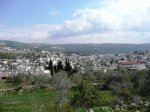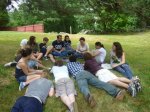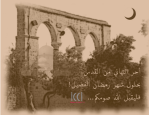Von Andrew Luisi & Chagit Lyssy
Andere willkommen heissen ist an und für sich schon eine schwierige Aufgabe, doch Miki Joelson glaubt, dass dies essenziell ist, um Beziehungen zu fördern und starke Bindungen zwischen Palästinensern und Israelis zu erzeugen. Miki arbeitete zwei Jahre lang als Leiterin des Programms “Faith to Faith/Face to Face“ (auf Deutsch: “Glaube gegenüber Glaube/Gesicht gegenüber Gesicht“), ein Partnerprojekt des Auburn Seminars in New York mit dem ICCI, und ist jetzt ein aktives Mitglied des ICCI Ehemaligen-Vereins für jüdische und palästinensische Jugendliche und junge Erwachsene für friedliche Koexistenz. Als jemand, die als Koordinatorin von Programmen und Events zur Förderung inter-religiöser Zusammenarbeit und Bewusstsein gearbeitet hat, vertrat sie den ICCI an der neunten Generalversammlung der Religionen für den Frieden in Wien, wo sie über ihre Arbeit mit ICCI zur Förderung von Einschliesslichkeit und dem Streben nach Koexistenz sprach.
Filed under: Alumni Community, Andrew Luisi, Current Events in Israel, English, Face 2 Face, German, ICCI Events, ICCI Programs, Interviews, Out and About in the Holy Land, Personal Stories and Testimonies, Stories of Inspiration | Leave a comment »






